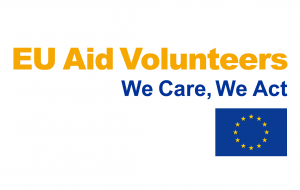EU AID Volunteers Initiative Capacity Building
The overall objective of the project is to contribute to sustainable development in communities, improved livelihoods through creation of resilient communities, and emergency assistance via voluntary technical humanitarian assistance.
Specific objectives:
1. Strengthening the technical and organizational capacity of consortium to manage volunteer deployment programmes in compliance with the EUAid Volunteer Initiative.
2. Strengthening the capacity of partners to conduct needs assessment as initial step to build capacity to contributing in developing resilience, preparedness and response capacity with respect to humanitarian crises.
3. Strengthening of value driven partnerships for the facilitation of deployment of technical skilled volunteers.
4. Accessibility of information on the EU Aid Volunteer Programme for all relevant stakeholdersinternally and externally.
The project took as point of departure mapping of the organisations’ previous experience in hosting and sending volunteers, combined with initial self-assessments against the certification criteria of the EUAid Volunteer Initiative. Online and onsite capacity building was conducted for all consortium partners, facilitating organisations in revisiting their vision, mission and strategy and develop policies and principles on which its work is based and code of conduct for those who take part being volunteers, staff or other affiliates as well as defining values for future partnership.
Security training was conducted for all consortium partners, and organisations were developing and qualifying their specific policies and procedures related to security. This capacity building supported organisations to ensure both that adequate precautions are being taken based on systematic assessment of risks and in establishing procedures to reduce health and safety risk, and helped establishing clear lines of command and procedures. Finally, capacity development covered multiple aspects of managing and guiding volunteers to enable them to contribute their knowledge experience and expertise. This included training in Core Humanitarian Standards, training in Needs Assessments, and on-site needs assessments. These needs assessments in turn were informing preliminary formulation of task assignment for future deployment of volunteers.
Output: Certification applications submitted by Build up Nepal, MAVUNO, EWBSL and EWBSWE and EWBDK, while DCA NEPAL was already certified. Material for strengthening organisations reflecting EU Aid requirements and Core Humanitarian Standards made available for public:procedures, policies, and principles including guides, examples and templates and presentations - to be tailored to the vision, mission and strategy of individual organisation and the specific context and areas of operation. Information and media products produced for social media, web, online and printed media material and disseminated.
Result: all 3 prospective Hosting organisations of the consortium achieved certification under the EU Aid Volunteer Initiative. Other results include the development of management systems for deployment, identification of needs-based task assignments for future volunteers, and the development/formulation of a deployment project draft informed by needs assessment, mapping of consortium organisations common areas of concern, complementary strength and potential for cross learning and synergies within consortium and beyond. The deployment project document remains a draft reflecting aspirations to form part of a deployment project under the EU Aid Volunteer initiative.
Specifications
- Project No.: 109
- Categories: West Africa, South America, Denmark, Capacity Building, Sierra Leone, Tanzania
- Budget: 2.795.000 DKK
- Project Manager: Dorte Madsen Lindegaard
- Partner Organization: Build Up Nepal, Mavuno Improvement for Community Relief and Services, Emergency Architecture and Human Rights, Folkekirkens Nodhjælp Fond

